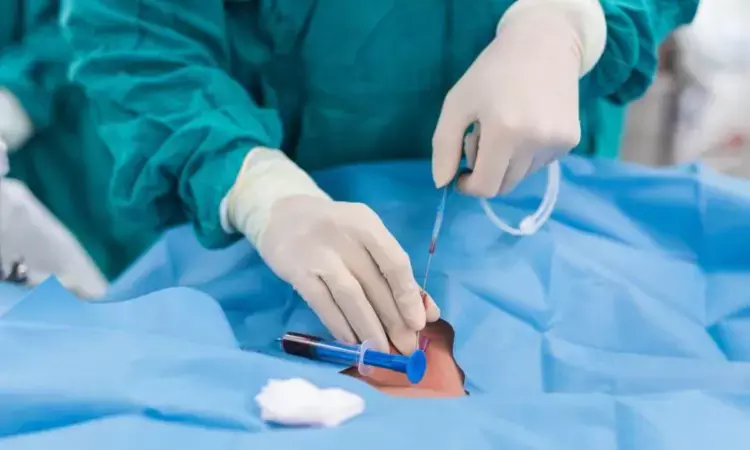- Home
- Medical news & Guidelines
- Anesthesiology
- Cardiology and CTVS
- Critical Care
- Dentistry
- Dermatology
- Diabetes and Endocrinology
- ENT
- Gastroenterology
- Medicine
- Nephrology
- Neurology
- Obstretics-Gynaecology
- Oncology
- Ophthalmology
- Orthopaedics
- Pediatrics-Neonatology
- Psychiatry
- Pulmonology
- Radiology
- Surgery
- Urology
- Laboratory Medicine
- Diet
- Nursing
- Paramedical
- Physiotherapy
- Health news
- Fact Check
- Bone Health Fact Check
- Brain Health Fact Check
- Cancer Related Fact Check
- Child Care Fact Check
- Dental and oral health fact check
- Diabetes and metabolic health fact check
- Diet and Nutrition Fact Check
- Eye and ENT Care Fact Check
- Fitness fact check
- Gut health fact check
- Heart health fact check
- Kidney health fact check
- Medical education fact check
- Men's health fact check
- Respiratory fact check
- Skin and hair care fact check
- Vaccine and Immunization fact check
- Women's health fact check
- AYUSH
- State News
- Andaman and Nicobar Islands
- Andhra Pradesh
- Arunachal Pradesh
- Assam
- Bihar
- Chandigarh
- Chattisgarh
- Dadra and Nagar Haveli
- Daman and Diu
- Delhi
- Goa
- Gujarat
- Haryana
- Himachal Pradesh
- Jammu & Kashmir
- Jharkhand
- Karnataka
- Kerala
- Ladakh
- Lakshadweep
- Madhya Pradesh
- Maharashtra
- Manipur
- Meghalaya
- Mizoram
- Nagaland
- Odisha
- Puducherry
- Punjab
- Rajasthan
- Sikkim
- Tamil Nadu
- Telangana
- Tripura
- Uttar Pradesh
- Uttrakhand
- West Bengal
- Medical Education
- Industry
Plasma D-Dimer Levels Could Predict Poor Outcomes in Stroke Patients Post-Endovascular Treatment: Study Finds

China: A recent study published in the Journal of Stroke and Cerebrovascular Diseases has highlighted the potential of post-procedural plasma D-dimer levels in predicting futile recanalization in stroke patients undergoing endovascular treatment (EVT).
The researchers revealed that elevated plasma D-dimer levels within 6 hours of endovascular treatment for acute ischemic stroke may predict futile recanalization (OR 1.25), helping to identify patients at risk of poor recovery. Additionally, a significant increase in D-dimer levels post-procedure was independently linked to futile recanalization, defined by poor functional outcomes (mRS score 3-6) at 90 days (OR 1.33).
Acute ischemic stroke, caused by a blockage in the brain's blood vessels, is a life-threatening condition that requires prompt intervention. Endovascular thrombectomy has become a key treatment for restoring blood flow to the affected brain region. However, despite successful recanalization, some patients experience poor outcomes, known as "futile recanalization." Elevated D-dimer levels may increase the risk of adverse clinical outcomes in these patients. However, the impact of serum D-dimer levels on the outcomes of reperfusion treatments has not been thoroughly evaluated.
To acknowledge this knowledge gap, Min Zhao, Department of Intensive Care Unit, Affiliated Hospital of Nanjing University of Chinese Medicine, Nanjing, Jiangsu, China, and colleagues aimed to explore the potential link between serum D-dimer levels and functional outcomes in stroke patients undergoing EVT.
For this purpose, the researchers enrolled patients with acute ischemic stroke who underwent successful endovascular treatment. Plasma D-dimer levels were measured before and within 6 hours after the procedure. Futile recanalization was defined as a modified Rankin Scale score of 3–6 at 90 days post-stroke. Multivariable logistic regression analyses examined the relationship between D-dimer levels and futile recanalization.
The investigation uncovered the following findings:
- Among the 161 enrolled patients, 78 (48.4%) were classified as having futile recanalization.
- After adjusting for potential confounders, high post-procedural D-dimer levels were significantly associated with futile recanalization (odds ratio 1.25).
- Serum D-dimer levels increased significantly after endovascular treatment in patients with futile recanalization.
- A significant post-procedural change in D-dimer levels was independently associated with futile recanalization (odds ratio 1.33).
"Elevated post-procedural plasma D-dimer levels, along with a significant increase in D-dimer after thrombectomy, may serve as indicators of futile recanalization in acute ischemic stroke patients undergoing endovascular treatment. The findings suggest that higher D-dimer levels could be considered a potential predictor for futile recanalization in stroke patients treated with EVT," the researchers wrote.
The authors, however, acknowledged several limitations in the study, including the lack of data on antithrombotic and statin therapy before EVT, and the limited D-dimer measurements at only two time points. They concluded, "future studies with multiple measurements and larger sample sizes are needed to validate these findings."
Reference:
Zhao, M., Dai, Z., Liu, R., Liu, X., & Xu, G. (2025). Post-procedural Plasma D-dimer Level May Predict Futile Recanalization in Stroke Patients with Endovascular Treatment. Journal of Stroke and Cerebrovascular Diseases, 108248. https://doi.org/10.1016/j.jstrokecerebrovasdis.2025.108248
Dr Kamal Kant Kohli-MBBS, DTCD- a chest specialist with more than 30 years of practice and a flair for writing clinical articles, Dr Kamal Kant Kohli joined Medical Dialogues as a Chief Editor of Medical News. Besides writing articles, as an editor, he proofreads and verifies all the medical content published on Medical Dialogues including those coming from journals, studies,medical conferences,guidelines etc. Email: drkohli@medicaldialogues.in. Contact no. 011-43720751


